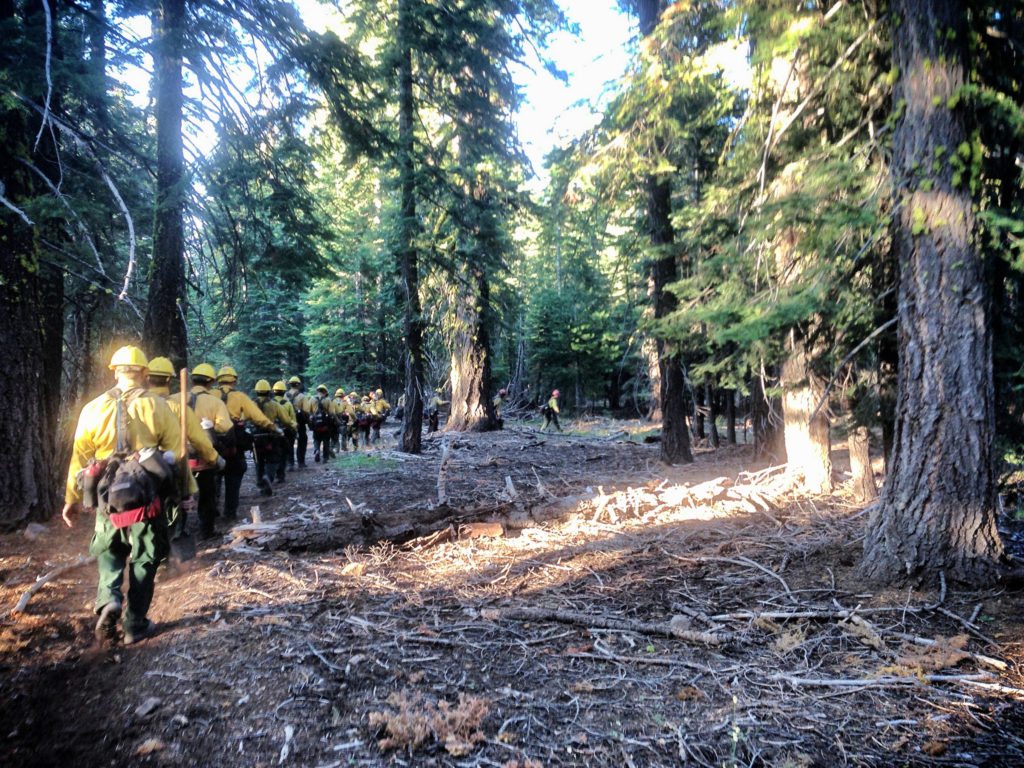Originally published at MintPress News.
SACRAMENTO, California — With wildfires blazing throughout the parched Western United States, the state of California has found a novel, though ethically questionable, way to save money on the state’s safety budget: Send state prisoners to work on the frontlines fighting forest fires for $2 per day.
“More than 100 wildfires are burning across the West — destroying dozens of homes, forcing hundreds of people to flee and stretching firefighting budgets to the breaking point,” wrote Tim Stelloh for NBC News on Monday. For California, he reported, that means some 14,000 firefighters combating 19 forest fires, including the “Jerusalem fire,” which covered over 25,000 acres before being mostly contained as of Saturday. “[T]he blaze — along with six others — was still sending smoke south across the San Francisco Bay Area,” Stelloh wrote.
About 4,000 low-level felons from California’s state prisons are fighting the fires, operating out of so-called “conservation camps,” according to Julia Lurie, writing on Friday for Mother Jones. “Between 30 and 40 percent of California’s forest firefighters are state prison inmates,” she reported. Inmates who committed certain offenses, like sex crimes or arson, are blocked from entering the firefighting program. Prisoners work in 24-hour shifts during forest fire season, followed by 24 hours off. Prisoners earn $2 a day just by being in the program, plus an additional $2 an hour when they are actively fighting fires.
Additionally, Lurie wrote, “[F]or each day they work in the program, the inmates receive a two-day reduction from their sentences.”

The above-average wages and sentence reductions, however, are hard-won, as the work is hazardous. According to the government fire tracking Incident Information System, ten firefighters were evacuated with minor injuries from the wildfire called the “Cabin Fire.” One firefighter, David Ruhl, died late last month fighting Northern California’s “Frog Fire,” CNN reported on Aug. 1. A spokesman for the state’s Department of Corrections and Rehabilitation told Lurie that there have been “only ‘two or three’ serious injuries and no deaths among inmate firefighters over the past two years.”
Some inmates find the experience a positive one — they eat better, are not racially segregated like in the jails, and live in cabins surrounding by chain-link fences rather than prison walls. Sarah Bufkin, writing for Bustle, quoted one inmate’s praise for the program:
“The lieutenant comes out and he goes, ‘Look, we’ll treat you like men first, firefighters second and prisoners if we have to,'” [Cory] Sills said. “That right there, that stuck in my head for two years now because now I have a chance to be treated like a man.”
However, the risk of injury or death is leading some to question the program, given the paltry options available to inmates:
Most inmates, [Buzzfeed’s Amanda] Lewis notes, wouldn’t do this work unless they had to, preferring to stay well away from the raging fires. But they take both the training and the work in stride because the only other option is a return to prison.
And, according to Julia Lurie, prison reform advocates are worried that the firefighting program is actually preventing more substantial improvements to prison conditions that might cut down on the availability of cheap prison labor:
The concern was magnified last fall, when lawyers for state Attorney General Kamala Harris argued that extending an early prison-release program to “all minimum custody inmates at this time would severely impact fire camp participation—a dangerous outcome while California is in the middle of a difficult fire season and severe drought.”